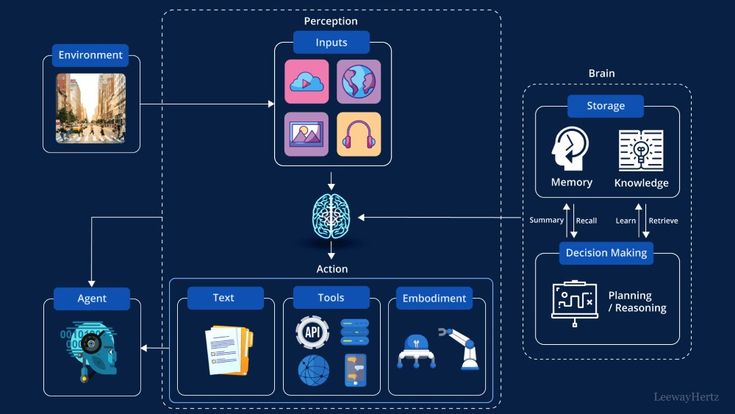As we navigate through 2025, artificial intelligence has evolved far beyond its initial capabilities, ushering in an era of intelligent automation through AI agents. These autonomous systems are reshaping how businesses operate, innovate, and deliver value. Let’s dive deep into understanding these transformative technologies and their impact on various industries.
Beyond Traditional Automation: The AI Agent Revolution
The journey from basic automation to intelligent AI agents represents a quantum leap in technological capability. Unlike conventional automation tools that follow predetermined rules, AI agents possess the ability to perceive, reason, and adapt to changing circumstances. This evolution marks a fundamental shift in how we approach business process automation.
From RPA to Intelligent Autonomy

Traditional Robotic Process Automation (RPA) has served businesses well in automating routine tasks. However, AI agents transcend these limitations by offering:
- Adaptive decision-making capabilities
- Complex task management
- Understanding of context and nuance
- Ability to handle unstructured data
- Dynamic response to changing environments
The Technical Foundation of AI Agents
Modern AI agents are built on sophisticated technologies that enable their autonomous operation:
Perception and Understanding
- Advanced natural language processing
- Computer vision capabilities
- Context-aware decision making
- Environmental interaction understanding
Reasoning and Planning
- Complex workflow management
- Predictive analysis
- Strategic decision-making
- Resource optimization
Industry Applications and Impact
The versatility of AI agents is demonstrated across various sectors:
Healthcare
AI agents are revolutionizing patient care through:
- Automated diagnostics support
- Personalized treatment planning
- Real-time patient monitoring
- Healthcare workflow optimization
Financial Services
The financial sector leverages AI agents for:
- Automated trading systems
- Fraud detection and prevention
- Risk assessment
- Customer service automation
Manufacturing and Supply Chain
In industrial settings, AI agents enable:
- Production line optimization
- Quality control automation
- Supply chain management
- Predictive maintenance
Leading Innovations in the Field
Major technology companies are driving significant advancements:
Nvidia’s Physical AI
Nvidia, a leader in AI hardware and software, is expanding its focus beyond chip-making to become a central player in the industrial economy. At the Consumer Electronics Show (CES) 2025, CEO Jensen Huang outlined a vision centered on agent robots, self-driving cars, and humanoid robots for factories. Nvidia introduced ‘Cosmos,’ a family of AI models designed to help robots and autonomous vehicles navigate the world by generating images and 3D models for training purposes. Companies like Toyota are partnering with Nvidia to develop next-generation autonomous driving systems, highlighting the growing importance of AI agents in various sectors.
“I’m optimistic that AI agents will become the next big thing for artificial intelligence”
Jensen Huang CEO Nvidia
Meta’s Integration of AI Bots into Social Media
Meta is integrating AI bots into its social media platforms, such as Facebook and Instagram. These AI characters, developed through substantial investment in generative AI, have bios, profile pictures, and can generate and share content alongside human users. This move reflects a broader trend of increasing AI involvement in social media, aiming to enhance user engagement and interaction.
Microsoft’s Integrated Approach
Microsoft has introduced AI agents designed to act like virtual employees, automating tasks to enhance productivity. These AI agents can plan and execute complex workflows based on simple prompts, adapt to changing needs, and improve output quality over time. This development signifies a shift towards more autonomous systems capable of handling intricate business processes.
Addressing Implementation Challenges
While the potential of AI agents is immense, organizations must navigate several key considerations:
Ethical Implementation
- Ensuring responsible AI deployment
- Maintaining transparency in decision-making
- Addressing workforce impact
- Protecting privacy and security
Technical Considerations
- Integration with existing systems
- Scalability and performance
- Data quality and management
- Security and compliance
Looking Ahead: The Future of AI Agents and Automation
As we progress through 2025, several trends are shaping the future of AI agents:
- Increased collaboration between human workers and AI systems
- More sophisticated decision-making capabilities
- Enhanced physical world interaction
- Greater autonomy in complex tasks
Conclusion
The evolution of AI agents represents a significant milestone in the journey toward intelligent automation. As these systems become more sophisticated, organizations that understand and effectively implement this technology will be better positioned to thrive in an increasingly automated world.
Explore how AI agents and InsightsWave Technologies can transform your business operations by visiting our AI Agents and Automation Services and exploring some of our success stories.





